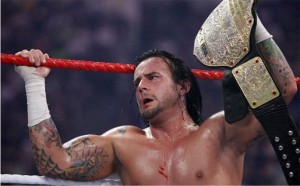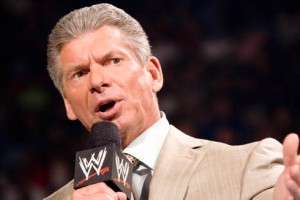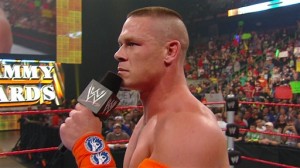To some, professional wrestling is nothing more than grown men play-fighting in (rather revealing) tights, all for the amusement of a gaggle of men age 14-40, men with too much time—and not enough female interaction—on their hands.
To me, it’s a masterpiece theater of athletes (yes, I said it) taking the stage night after night in a showcase of talent and charisma.
It’s the quintessential jock soap opera. Scripted? Yes. Fake? Hardly.
The latest example of wrestling’s blurred line of reality was on display two weeks ago via a Monday Night Raw promo from WWE superstar CM Punk, a straight-edge, tattooed heel who abstains from drugs, alcohol and other human vices. In this promo, Punk took to the mic and ripped down wrestling’s “fourth wall.” There were no sacred cows. He ripped WWE Chairman Vince McMahon for poor decision-making, the WWE marketing team for holding him and other performers back, powers-that-be such as Stephanie McMahon and husband HHH (heirs to the Vince McMahon throne) for their ineptitude and, most importantly, the fans for their continued contribution to what has, quite frankly, been a lousy on-air product since Stone Cold Steve Austin and The Rock left town.
 Punk followed that up two weeks later by publicly chiding McMahon (on hand for this particular browbeating as part of a “contract negotiation”) for being out of touch with wrestling’s 2011 audience, for holding down and mistreating legitimate talents (many of whom Punk considers friends), for being a bully and, perhaps most importantly, for taking the fun out of wrestling nightly before thousands of adoring fans.
Punk followed that up two weeks later by publicly chiding McMahon (on hand for this particular browbeating as part of a “contract negotiation”) for being out of touch with wrestling’s 2011 audience, for holding down and mistreating legitimate talents (many of whom Punk considers friends), for being a bully and, perhaps most importantly, for taking the fun out of wrestling nightly before thousands of adoring fans.
Punk, whose WWE contract is legitimately set for expiration at midnight on Monday, July 18, offered on both occasions what’s known as a “shoot” promo, wherein “real life” is brought into the WWE’s fictitious realm. Yes, both promos (particularly the latter exchange with McMahon) were scripted and approved by McMahon and WWE’s writing team, all in the hopes of upping the buyrate for WWE’s upcoming Money in the Bank pay-per-view—the main event of which will pit CM Punk against champion John Cena. If Punk wins the match in his hometown of Chicago, he’s taking the belt with him on his way out the door, perhaps to an independent organization like Ring of Honor. If Cena loses, Vince McMahon has threatened to “fire” the PG-friendly champion for letting Punk do just that.
 It’s all an act, part of a grand tale tailored to move merchandise, sell pay-per-views and increase hits on the WWE website. It’s also based in reality, something WWE has largely avoided since superstars like Austin, The Rock, Bret Hart and Shawn Michaels rose to prominence, essentially, by playing themselves on camera.
It’s all an act, part of a grand tale tailored to move merchandise, sell pay-per-views and increase hits on the WWE website. It’s also based in reality, something WWE has largely avoided since superstars like Austin, The Rock, Bret Hart and Shawn Michaels rose to prominence, essentially, by playing themselves on camera.
Since then, WWE has made an effort, largely in vain, to force new stars upon the masses—Cena, HHH, Randy Orton, Batista, Edge, among others. These men have each experienced varied levels of success over the past decade—Cena, arguably, has experienced the most mainstream crossover success—but were always held back by one underlying factor. At the end of the night, it always felt like they were, to an extent, playing a disingenuous, on-air character.
Enter CM Punk.
A wrestling lifer who made his name on the independent circuits, Punk came to WWE a few years back promoting his straight-edge lifestyle and in-ring abilities. He fared well for himself, even holding the World Heavyweight Championship for a spell. His reign was fairly forgettable—in part because his on-air character felt forced and lacking in depth—and Punk went back to the mid-card, where he spent most of the time in inconsequential feuds that, while hardly mediocre, didn’t exactly excite fans to the point of shelling out their dollars on merchandise and pay-per-views. He had fallen into the realm of “good worker,” not a bad place to be in terms of job security, but certainly not a place designed for the upwardly mobile.
 That is, until Monday, June 27, when Punk changed the course of his character and, temporarily at least, the professional wrestling landscape, with a pitch-perfect promo that highlighted WWE’s ills, his frustrations with the behind-the-scenes politics and the fact that the organization now favors “superstars” over actual “wrestlers.” Gone was the character Punk had been portraying for the past few years. On display was the raw emotion brought forth by a man who knew he—and WWE’s paying customers—deserved better.
That is, until Monday, June 27, when Punk changed the course of his character and, temporarily at least, the professional wrestling landscape, with a pitch-perfect promo that highlighted WWE’s ills, his frustrations with the behind-the-scenes politics and the fact that the organization now favors “superstars” over actual “wrestlers.” Gone was the character Punk had been portraying for the past few years. On display was the raw emotion brought forth by a man who knew he—and WWE’s paying customers—deserved better.
The promo was an instant hit, a Twitter trend, garnering millions (and millions!) of hits on YouTube. Punk got mention from the likes of Jim Rome and Bill Simmons. Once again, if only for a passing moment, wrestling was “in” again. While his exchange with McMahon experienced slightly less online discourse, mostly because it was advertised in advance and thus came with less of a “shock” factor, that promo too served its purpose—for the first time in a long time, it gave wrestling fans a legitimate rooting interest in a WWE pay-per-view main event.
This, too, shall unfortunately pass. All indications are that Punk is legitimately gone after Money in the Bank, and that Cena (by all accounts a nice, hardworking guy) will retain the belt before moving on to his next (largely forgettable) feud—that is, until the inevitable hype machine cranks up for his showdown with The Rock at WrestleMania 28 next April.
Whatever the outcome, for an all-too-brief window of time in the summer of 2011, a tattooed malcontent took us back to the days when wrestling mattered, when Monday nights were anticipated,and when—even in a fictitious world—reality was still a possibility.
